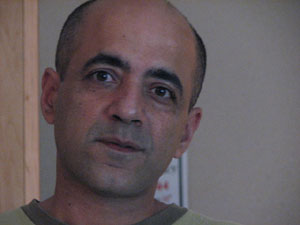LALIT VACHANI: ABOUT
Films | Election Diaries | Press and Screenings | About | Contact | Home
|
|
Lalit Vachani is a documentary filmmaker, editor, lecturer and research scholar at CeMIS (the Centre for Modern Indian Studies) at the University of Göttingen. Lalit Vachani’s documentaries include The Starmaker (74 min; 1997 - about the business of ‘starmaking’ in the Hindi film industry); The Boy in the Branch (27 min; 1993) and its sequel, The Men in the Tree (98 min; 2002), about the politics and the ideology of the Hindu nationalist organization, the RSS; Natak Jari Hai/The Play Goes On (84 min; 2005) is about the Delhi based left street theatre group, Jana Natya Manch (JANAM); The Salt Stories (84 min; 2009), follows the trail of Mahatma Gandhi’s salt march in India after seventy years; Tales from Napa (26 min; 2010), is about a village that resisted Hindu fundamentalist forces during the 2002 riots in Gujarat; An Ordinary Election (125 min; 2015), is an in-depth study of an Indian election campaign for a new political party - the AAP; Die Letzten Tage/The Last Days (81 min; 2019) captures the final days of a refugee centre in the Harz mountains of Germany and Recasting Selves (80 min; 2019) is about the ‘soft skills’ training of Dalit and Adivasi post-graduate students at CREST (the Centre for Research and Education for Social Transformation) in Kerala. In 2007, Vachani directed In Search of Gandhi as one of ten international filmmakers commissioned to make 52 min. films for the 'Why Democracy?' global television series which was broadcast across 35 international television channels, including ZDF/Arte in Germany, BBC and BBC World (UK), Arte (France), Canal + (Spain), SBS (Australia), NHK (Japan) and SABC (South Africa). Currently, he is working on a new documentary series (working title: Hindutva ke Afsane/Hindutva Stories) on the impact of Hindu nationalism on Indian society. Three films have been produced by Wide Eye Film in association with CeMIS. Prisoner No. 626710 is Present (60 min; 2024)is about citizenship, student protests and the imprisonment of Umar Khalid; A Day in Muzaffarnagar (23 min; 2024), follows members of a citizens fact-finding group over the course of a day in the aftermath of anti-Muslim violence in Muzaffarnagar; and Encountering Hate (48 min; 2025) is a film that follows Akram, a human rights lawyer who provides legal help to victims of vigilante violence and encounter killings in Uttar Pradesh. Vachani’s films have received grant awards from the Sundance Documentary Foundation, the Jan Vrijman Fund, and the India Foundation for the Arts. Some of the venues and film festivals where his work has been shown include: Kino Arsenal, Berlin; Oberhausen International Short Film Festival and DOK-Leipzig in Germany; International Documentary Film Association (IDFA), Amsterdam; Festival International du Documentaire, Marseille; International Film Festival of Rotterdam; One World Human Rights Film Festival, Prague; the Asian Social Forum, Hyderabad; the World Social Forum, Mumbai, and the Queens Museum of Art, New York. In 2021-2022, Vachani curated the online documentary series, Crossings and he is the co-producer (along with Srirupa Roy) of Election Diaries, a series of films about electoral democracy and the Indian elections of 2019 and 2024. Vachani has taught on topics related to film analysis, media, politics and the documentary film at the Mass Communication Research Centre in Delhi, India; at the University of Massachusetts-Amherst, and at Amherst College in the USA. He was visiting scholar at the Center for Media, Culture and History at New York University in 1999, and Research Fellow at the Max Planck Institute for Religious Diversity and at the Lichtenberg-Kolleg in Göttingen in 2011 and 2012. He currently teaches courses on media and politics, the political documentary film and documentary theory and production at the Centre for Modern Indian Studies (CeMIS) at the University of Göttingen. |
